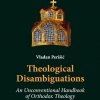Slava is the celebration of the patron saint for each family in Serbia. Different families have different saints, handed down through the generations.
The tradition is a centrepiece of family life - festivities last three days, and include feasts and dancing as well as religious ceremonies.
The BBC's Guy De Launey joined one family as they marked the day of St Sava, also the patron saint of Serbia.
The Close-up series focuses on aspects of life in countries and cities around the world. What may seem ordinary and familiar to the people who live there can be surprising to those who don't.
.



